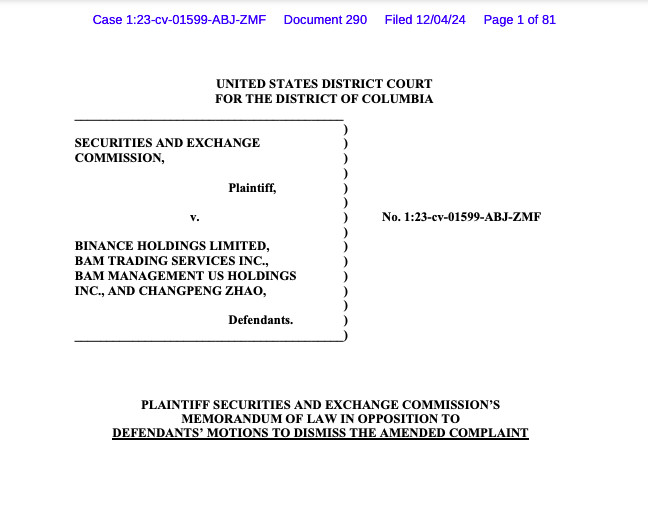Binance Faces Legal Heat as SEC Expands Allegations of Unregistered Securities Trading and Market Manipulation


In Brief
The US SEC is intensifying its legal battle with Binance US, accusing the exchange of running an unregistered securities exchange and improperly processing crypto securities.

With the SEC defending its revised case against the cryptocurrency exchange Binance US and its founder Changpeng Zhao (CZ), the US Securities and Exchange Commission’s ongoing legal battle with Binance has intensified. A historic struggle in the regulation of digital assets is emerging from the lawsuit, which is based on claims of running an unregistered securities exchange and improperly processing crypto securities.

Context of the Legal Conflict
The SEC filed the charges in June 2023, alleging that Binance had enabled the trading of 10 or more cryptocurrencies that were classified as securities by the Howey test. This test, which originated from a Supreme Court decision in 1946, evaluates factors including financial participation in a joint venture with the hope of earning benefits from the labor of others in order to decide what qualifies as an investment contract.
Binance’s conduct concerning main and secondary market transactions of several cryptocurrencies, including Binance’s native coin, BNB, are the subject of the SEC’s updated complaint, which elaborates on these claims. It makes the case that these transactions are clearly covered by securities legislation, citing fresh data and logic following the previous complaint’s legal hurdles.
The Legal Argument of the SEC
The main claim made by the SEC is that Zhao and Binance intentionally enabled the trade of unregistered securities. According to the updated lawsuit, Binance made extensive promotional efforts to present BNB and other cryptocurrencies as investment prospects, giving investors a realistic expectation of return.
Furthermore, Binance’s claim that securities cannot be involved in secondary market transactions is clearly refuted by the SEC’s petition. It highlights that rather than focusing on the formal structure of transactions, the Howey test is applicable to their economic reality. Since they were based on the issuers’ attempts to increase token value through ecosystem expansion, the SEC claims that even secondary sales of cryptocurrencies on Binance’s platform qualified as securities transactions.
Binance’s Response and Criticism of the SEC
Zhao and Binance have filed a request to dismiss the revised complaint, arguing that the SEC’s allegations are not supported by enough evidence to pass the Howey test. They contend that the SEC has not shown an obvious connection between the growth of the projects linked to crypto sales and the money earned via their sales. Furthermore, Binance argues that by retrospectively applying securities rules to a developing market without providing clear guidance, the SEC is going beyond its regulatory powers.
The defendants also call the SEC’s strategy contradictory, claiming that it singles out some organizations while leaving the larger crypto industry uncontrolled. They contend that the SEC’s enforcement efforts are an overreach that is impeding innovation in the digital asset market in the United States.
Evaluation by the Court and Legal Consequences
A key player in the lawsuit has been Judge Amy Berman Jackson of the U.S. District Court for the District of Columbia. She had already rejected parts of the SEC’s original case, stating that there was not enough proof linking BNB’s secondary market operations to securities offenses. Her criticisms, however, prompted the SEC to support its assertions in the revised filing, concentrating on Binance’s marketing initiatives and market structure.
The lawsuit calls into doubt the SEC’s authority and how digital assets should be classified. A decision in the SEC’s favor may establish a precedent for the application of securities laws to a variety of cryptocurrencies and associated platforms, therefore changing the legal environment for the sector.
The SEC has initiated a number of steps against crypto platforms, including the case against Binance. Allegations of trading unregistered securities have also been made against Coinbase, another major exchange. Together, these actions demonstrate the SEC’s assertive approach to digital assets and its goal of using litigation to provide regulatory clarity.
This enforcement-first strategy, according to critics, discourages innovation and investment in blockchain technology by fostering ambiguity. However, proponents believe it is an essential move to safeguard investors against fraudulent schemes and to appropriately incorporate cryptocurrencies into the larger financial system.
Wider Consequences for the Cryptocurrency Industry
The SEC’s strategy for regulating and enforcing cryptocurrency laws will probably be impacted by the Binance case’s verdict. Exchanges and token issuers may seek compliance with securities laws if the SEC is granted a favorable judgment, which would give the agency the confidence to pursue similar cases. On the other hand, the sector could be inspired to contest the SEC’s interpretations if the allegations against Binance are dropped or reduced.
The case emphasizes to investors the value of doing their research before investing in cryptocurrencies, especially when it comes to comprehending the regulatory dangers connected to digital assets. As legal and regulatory frameworks change, it also acts as a reminder of the market’s possible instability.
In terms of cryptocurrency regulation, the SEC’s defense of its modified complaint against Binance and CZ marks a turning point. The case perfectly captures the larger conflict between the cryptocurrency sector’s need for innovation and autonomy and regulatory bodies looking to impose order on a developing business.
Disclaimer
In line with the Trust Project guidelines, please note that the information provided on this page is not intended to be and should not be interpreted as legal, tax, investment, financial, or any other form of advice. It is important to only invest what you can afford to lose and to seek independent financial advice if you have any doubts. For further information, we suggest referring to the terms and conditions as well as the help and support pages provided by the issuer or advertiser. MetaversePost is committed to accurate, unbiased reporting, but market conditions are subject to change without notice.
About The Author
Victoria is a writer on a variety of technology topics including Web3.0, AI and cryptocurrencies. Her extensive experience allows her to write insightful articles for the wider audience.
More articles

Victoria is a writer on a variety of technology topics including Web3.0, AI and cryptocurrencies. Her extensive experience allows her to write insightful articles for the wider audience.


















































